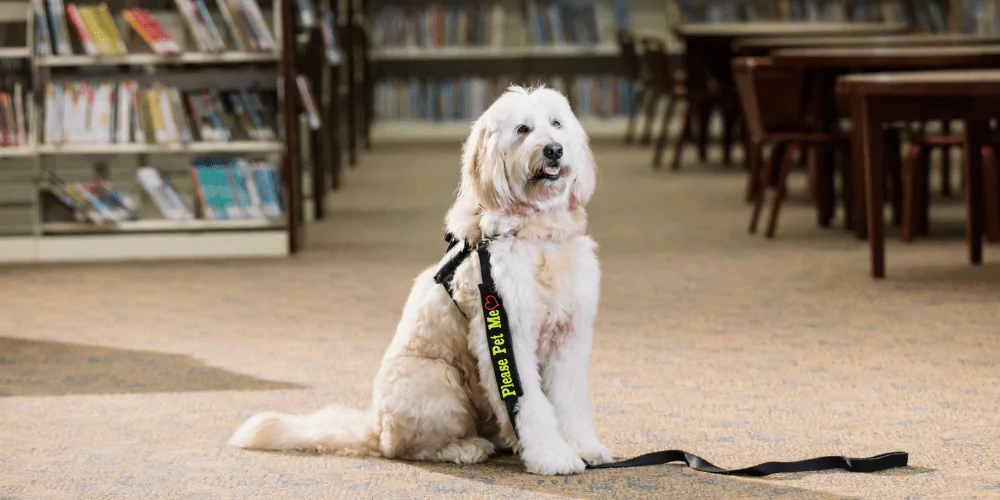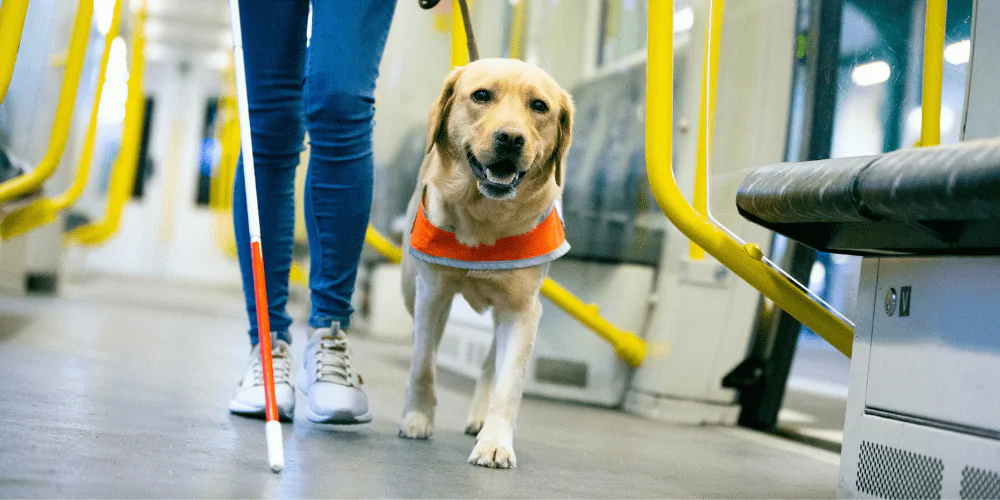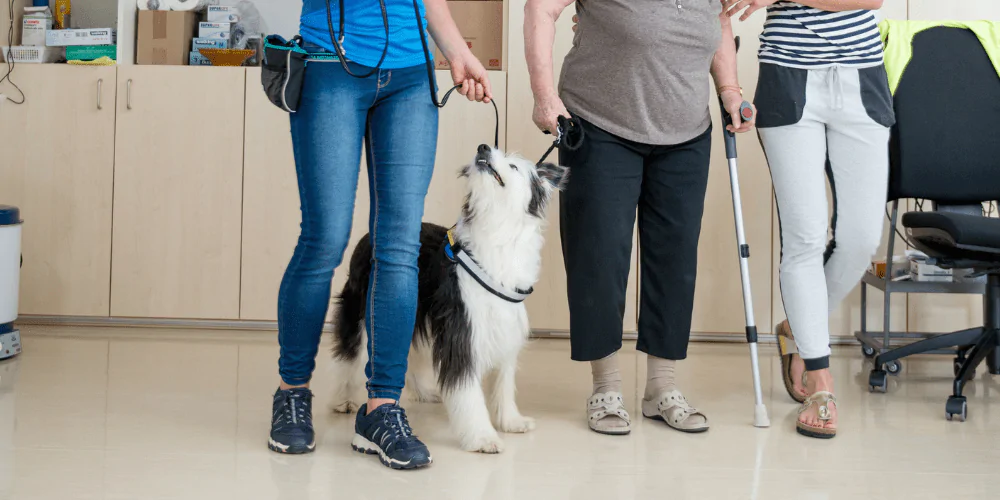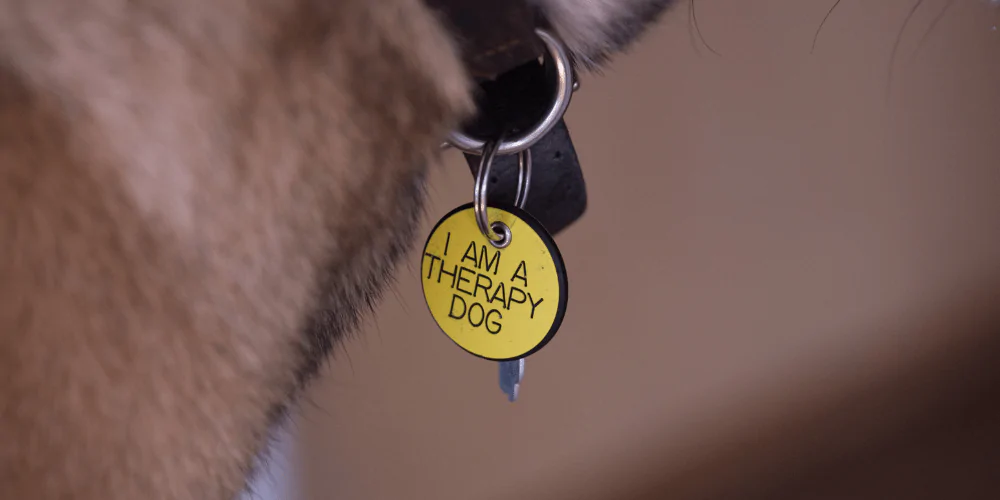
What is a therapy dog and how do I find one for my family?

Dr Scott Miller
16 March 2023 | 6 minutes read
Meet Ludo, the newest member of the Miller pack! Dr Scott Miller shares how he introduced this loveable Bernadoodle into the family. From choosing the breed to training and caring for their needs, here’s your top tips from an experienced vet on finding your therapy dog.
- How did you decide on the breed of your therapy dog?
- How did you find Ludo?
- What kind of pet therapy is Ludo giving to the family?
- How are you training Ludo?
- How are you looking after Ludo’s wellbeing?
- Do you take Ludo everywhere with you?
- Your overview of therapy dogs
> What is a therapy dog?
> What’s the difference between a therapy dog and an assistant dog?
> Can therapy dogs go anywhere in the UK?
> What breeds are ideal for a therapy dog?
> Can I get insurance for a therapy dog?

How did you decide on the breed of your therapy dog?
My wife has lots of allergies and is especially allergic to certain animals, so we realised we needed to find a low allergenic dog (as no breed is fully hypoallergenic).
My two younger children are autistic; my son is high functioning and my daughter is non-verbal. So it was important that we find a dog that didn’t shed and was bigger in size (to withstand being pulled around a little), but also had a calm temperament.
I’ve always loved Bernese Mountain Dogs but we learned from owners that they’re shedders. That’s when we looked into a poodle mix and found Bernedoodles.
How did you find Ludo?
Finding Ludo involved research and making sure we were making the right decision for everyone – us and the pup. Whether you’re looking to buy or adopt a dog (for therapy needs or just as a family member), you need to be responsible.
Ethical breeders know so much about the animals they raise, including the good and bad of their health and behaviour. They want them to go to the right homes.
Lots of people make massive mistakes when choosing a dog. Always think:
- Is the dog right for the family, or do I just like the look/feel sorry for them?
- Can I afford to look after them?
- Can I manage the progress and setbacks of training and settling them in?
Have an honest sit-down and decide if getting a dog is the right thing to do. If you come up with a no, don’t do it.
What kind of pet therapy is Ludo giving to the family?
The therapy side of things has been quite successful with my son (who’s a bit older). We’ve been encouraging him to get involved in Ludo’s training. It gives him the tools to manage his anxiety as he needs to be in a calm mindset to work with her. It’s also teaching him responsibility.
My daughter still sees Ludo just as a big fluffy thing in her way and doesn’t really engage with her. But Ludo isn’t intimidated and continues to stay calm and tries to interact. She’s actually very protective of our youngest given she’s generally ignored by her!
How are you training Ludo?
Like every dog, Ludo gets a lot of your core basics – essentially puppy training 101. She’s very food motivated and works for everything she gets.
Puppy toilet training is proving to be on the slightly tricky side thanks to the cold weather! But we’re guiding her to one position in the house and using a puppy pad. When we’re out and about we’re working on Ludo’s lead training, walking to heel, and recall.
We can’t do much more than that until she’s fully grown – which is important to remember. You need to think about maturity before you push the boat out with exercise and agility.
Soon we’ll hopefully be getting Ludo used to different kinds of transport. We’re building up short distances in the car and seeing how she gets on (as car sickness is an issue for puppies).
How are you looking after Ludo’s wellbeing?
As Ludo is a therapy dog, we appreciate that she needs a good morning walk to burn off her puppy excitement and energy. This helps avoid a clash between her and the kids.
But it’s not all about Ludo helping us. She deserves her own special time and attention. And we never leave Ludo alone with the kids – she’s not there as their sole entertainment or carer.
It’s all about responsible pet ownership, making sure they have the training, nutrition, and support to be their best self. After all, dogs show us unconditional love, so we should be giving them the same back.
Do you take Ludo everywhere with you?
There’s very few public places that will allow non-assistance dogs, so therapy dogs can struggle to get in. Hopefully this will change in the future.
Ludo is there for the kids at home and when we’re generally out and about. We do try and take her to places with us – she’s good at sitting under the table. She’s not overly boisterous or shy, seems comfortable in herself, and says hello to other dogs.
We also have an amazing teacher in our first dog Skully and Ludo tends to follow her lead. Dogs are pack animals and want constant attention so sometimes it helps to have an older dog guide a younger one.

Your overview of therapy dogs
> What is a therapy dog?
A therapy dog brings emotional, mental, and even some physical support to their owners and family.
Some pet owners decide to train their dogs as therapy animals so they can volunteer for organisations like Therapy Dogs Nationwide (TDN).
Volunteering therapy dogs are brought into community places like schools, hospitals, libraries, and care homes. To name but a few positives, their loveable and comforting natures can help:
- Boost wellbeing
- Create a calming environment
- Improve focus
Organisations like TDN will check that the dog’s temperament is suited to the role for which they’re volunteering. They’ll also make sure they meet other must-haves, such as being at least 9 months old and fully vaccinated.

> What’s the difference between a therapy dog and an assistant dog?
A therapy dog offers general mental support and comfort to anyone who needs it.
An assistance dog is trained to support disabled people or those with medical conditions.
They go through rigorous training to help their human with a variety of everyday tasks. Examples of assistance dogs include:

> Can therapy dogs go anywhere in the UK?
Unlike assistance dogs (who are supported by The Equality Act 2010), therapy dogs aren’t allowed to go in all public places in the UK.
They’ll need permission to go into shops, restaurants, and community buildings.

> What breeds are ideal for a therapy dog?
Ultimately it’s the temperament of each individual pup that decides if they’re right to be a therapy dog.
Some breeds have naturally affectionate and heartwarming natures that could give them an edge. According to Tails.com, the following breeds have really helped their pet owners de-stress:
- Labradors
- Lurchers
- Labradoodles
- Yorkshire Terriers
- Bichon Frise

> Can I get insurance for a therapy dog?
Always check the policy wording of your insurance provider to see if they’ll cover your therapy dog.
Petsure dog insurance offers flexible cover for your therapy pup. They’re also covered for volunteer therapy work with an organisation.


